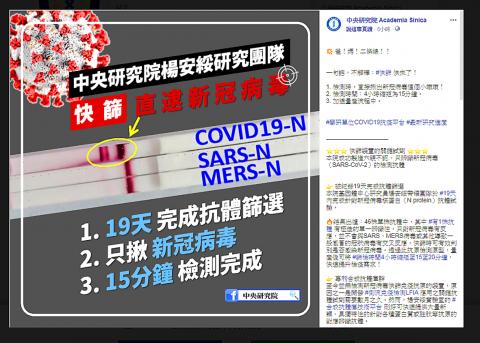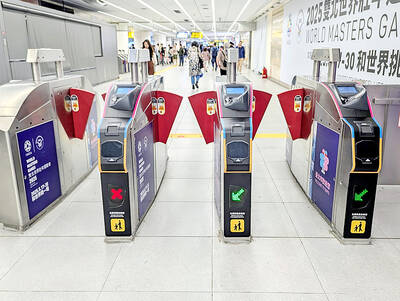Academia Sinica yesterday said that it has synthesized monoclonal antibodies that can identify the protein of the coronavirus that causes COVID-19, which it said is an important step toward producing a rapid screening reagent for the virus.
The potential reagent, if successfully mass produced, would shorten the testing time for COVID-19 from about four hours to 15 to 20 minutes, significantly improving screening efficiency, the nation’s top academic research institution said in a statement on Facebook.
Yang An-suei (楊安綏), an Academia Sinica research fellow at the Genomics Research Center who headed the team that synthesized the antibodies, said that for rapid screening to work, the reagent should accurately identify the new coronavirus.

Screen grab from Academia Sinica’s Facebook page
The team produced 46 monoclonal antibodies in just 19 days, with each sample weighing at least 1mg, based on seven human coronavirus nucleocapsid protein antigens, Yang said.
One of the antibodies has demonstrated “perfect” efficiency in identifying the new coronavirus, because it does not react to other members of the coronavirus family, including those that cause SARS and Middle East respiratory syndrome, Yang added.
Data about the antibodies would be placed on the COVID-19 platform the institute has built to share information with domestic academic and scientific research institutes to speed up the development of rapid screening kits, drugs and vaccines to combat the epidemic, Academia Sinica President James Liao (廖俊智) said.
Yang’s team achieved its goal two months ahead of schedule, Liao said.
Assisted by the Ministry of Economic Affairs, the research team would hold talks with several companies about the production of rapid screening kits based on the research results, Academia Sinica said.
If everything goes smoothly, mass production could begin soon after the Ministry of Health and Welfare verifies and approves the reagent, within the next three to four months, the institute said.
The disease has infected more than 100,000 people in more than 80 nations and territories, including Taiwan, and has killed more than 3,000 people since it was first reported in Wuhan, China, in December last year.

A magnitude 6.4 earthquake struck off the coast of Hualien County in eastern Taiwan at 7pm yesterday, the Central Weather Administration (CWA) said. The epicenter of the temblor was at sea, about 69.9km south of Hualien County Hall, at a depth of 30.9km, it said. There were no immediate reports of damage resulting from the quake. The earthquake’s intensity, which gauges the actual effect of a temblor, was highest in Taitung County’s Changbin Township (長濱), where it measured 5 on Taiwan’s seven-tier intensity scale. The quake also measured an intensity of 4 in Hualien, Nantou, Chiayi, Yunlin, Changhua and Miaoli counties, as well as

Credit departments of farmers’ and fishers’ associations blocked a total of more than NT$180 million (US$6.01 million) from being lost to scams last year, National Police Agency (NPA) data showed. The Agricultural Finance Agency (AFA) said last week that staff of farmers’ and fishers’ associations’ credit departments are required to implement fraud prevention measures when they serve clients at the counter. They would ask clients about personal financial management activities whenever they suspect there might be a fraud situation, and would immediately report the incident to local authorities, which would send police officers to the site to help, it said. NPA data showed

ENERGY RESILIENCE: Although Alaska is open for investments, Taiwan is sourcing its gas from the Middle East, and the sea routes carry risks, Ho Cheng-hui said US government officials’ high-profile reception of a Taiwanese representative at the Alaska Sustainable Energy Conference indicated the emergence of an Indo-Pacific energy resilience alliance, an academic said. Presidential Office Secretary-General Pan Men-an (潘孟安) attended the conference in Alaska on Thursday last week at the invitation of the US government. Pan visited oil and gas facilities with senior US officials, including US Secretary of the Interior Doug Burgum, US Secretary of Energy Chris Wright, Alaska Governor Mike Dunleavy and US Senator Daniel Sullivan. Pan attending the conference on behalf of President William Lai (賴清德) shows a significant elevation in diplomatic representation,

The Taipei MRT is to begin accepting mobile payment services in the fall, Taipei Rapid Transit Corp said on Saturday. When the company finishes the installation of new payment units at ticketing gates in October, MRT passengers can use credit cards, Apple Pay, Google Pay and Samsung Pay, the operator said. In addition, the MRT would also provide QR payment codes — which would be compatible with Line Pay, Jkopay, iPass Money, PXPay Plus, EasyWallet, iCash Pay, Taiwan Pay and Taishin Pay — to access the railway system. Currently, passengers can access the Taipei MRT by buying a single-journey token or using EasyCard,